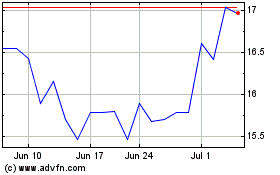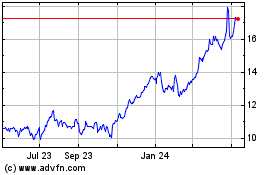A Look At Deutsche Bank's Bond Buyback
February 11 2016 - 3:02AM
Dow Jones News
(FROM THE WALL STREET JOURNAL 2/11/16)
By Christopher Whittall and Jenny Strasburg
The news that Deutsche Bank AG is considering buying back a
chunk of its own debt has sparked a rally in European banking
shares, which had taken a beating this year. We step through what
Germany's largest lender by assets is contemplating and why.
Why is Deutsche Bank in the headlines?
It is troubled. Deutsche Bank stock was down 34% year to date
through early afternoon Wednesday. Long-standing worries that the
bank is too thinly capitalized had been exacerbated by weak
financial results, uncertainty about a restructuring of the bank,
and market moves beyond the bank's control. The worries spread to
bond prices, which are usually more resilient than stocks, with the
bank's debt selling off sharply. Fears that Deutsche may not be
able to pay an interest payment due in April on one of its junior
bonds -- contingent convertible debt, known as CoCos -- further
fanned the flames.
What has it done?
Several things. Late Monday, the bank released a rare statement
saying it had enough funds to make that bond payment and expects to
be able to make 2017 payments as well. Deutsche is considering
buying back several billion euros of its debt, a move aimed at
shoring up its bonds. Separately, Deutsche's new co-chief
executive, John Cryan, told employees the bank is "rock solid."
How have the moves been received?
On Wednesday, Deutsche's shares rose 10%. Its bonds also
rallied. The cost of insuring against a default for five years on
Deutsche senior debt using credit-default swaps fell $28,000, to
$225,000 a year, according to Markit.
What's the likely plan?
A debt buyback would likely focus on the bank's senior debt, not
its CoCos. The bank could either start purchasing its own bonds on
the open market or announce a formal tender. In the latter case, it
would announce a pool of bonds trading below face value that it
intends to buy at a set price, most likely above market levels to
tempt investors to participate.
Why buy its own bonds?
To show strength. One goal would be lowering its funding costs,
which are tied to its credit-default-swaps spread. Deutsche has a
large derivatives book. A lower swaps spread typically makes
derivatives positions less costly to fund and would reassure other
banks that trade with Deutsche. The bank also needs to hold on to
corporate clients, who might otherwise be tempted to move deposits
and business elsewhere. By doing a buyback, Deutsche could signal
to investors that the market is undervaluing these securities. It
also would underscore that Deutsche has access to the cash it needs
to take such a step.
So, is the crisis over?
Hardly. Some pressure has been relieved, but fundamental issues
remain, particularly with uncertainty over broader markets that are
key to Deutsche's bottom line. Investors have been concerned it
won't be able to cut costs adequately and meet regulatory
requirements to boost its capital levels. Buying back a few
billions euros of its debt at a discount would increase capital
levels marginally and shrink its balance sheet, boosting its
capital ratios. But questions about the bank's ability to generate
profits would remain. The road ahead is likely to be long and
rocky.
---
Paul Davis contributed to this article.
(END) Dow Jones Newswires
February 11, 2016 02:47 ET (07:47 GMT)
Copyright (c) 2016 Dow Jones & Company, Inc.
Deutsche Bank Aktiengese... (NYSE:DB)
Historical Stock Chart
From Mar 2024 to Apr 2024

Deutsche Bank Aktiengese... (NYSE:DB)
Historical Stock Chart
From Apr 2023 to Apr 2024
